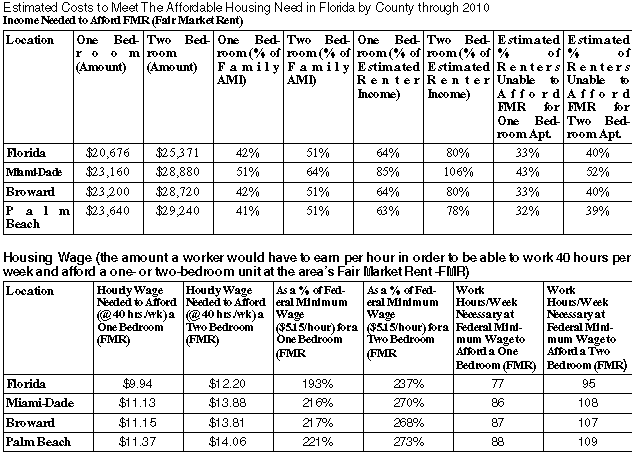
Back to Neighborhood Transformation mainpage
9/19/01
Findings & Recommendations of
The Florida Affordable Housing Study Commission -2001
The Florida Housing Study Commission recently released their Annual Report for 2001 that members and housing advocates should enjoy.
The Findings:
 * Maximum Affordable Housing
Cost Represents the Generally Accepted Standard of Spending Not More than 30% of
Income on Housing Costs
* Maximum Affordable Housing
Cost Represents the Generally Accepted Standard of Spending Not More than 30% of
Income on Housing Costs* AIM=Area Median Income (HUD, 2000)
* FMR-Fair Market Rent (HUD, 2001)
The Recommendations:
Importance of the U.S. Census: To acquire an accurate assessment of housing need, the public and private sectors should work in conjunction with the Federal government during Census years to carry out an intensive publicity campaign encouraging households to fill out their Census forms.
Local Inclusionary Housing and Linkage Fee Ordinances: Local governments should consider adopting land use ordinances, such as inclusionary housing and linkage fees, to strengthen the community's capacity to provide affordable housing.
Addressing Substandard Housing: In order to eliminate substandard housing and life safety issues, local governments should implement fee-based periodic inspection programs to address code violations of single- and multifamily rental units.
Finding Other State Funds to Work for Affordable Housing: The Florida Housing Finance Corp. should develop and administer a single family pension fund and targeted to lower income homeowners.
Use TANF Funds for Housing
-
In setting procedures for the Individual Development
Account program funded with TANF, Workforce Florida, Inc. should require a financial
and economic literacy component
-
The Florida Housing finance Corp. should continue
to provide a point incentive in its competitive rental applications to developers
who elect to provide a down payment assistance program for tenants.
-
Local SHIP administrators should consider developing
an IDA program by bringing in funds from such sources as financial institutions,
employers and the local government in order to offer assistance to those seeking
homeownership.
-
The Florida Legislature should restore funding
for the "Temporary Financial Assistance for Homeless Families" Program
at a minimum of $5 million annually.
-
The Florida Legislature should appropriate TANF
funds for short term (120 days or less) tenant based assistance and/or the state's
"maintenance of effort" matching funds for longer term tenant based rental
assistance.
- Because the purpose of TANF funds is to supplement state funds, the Florida legislature should not supplant general revenue funded programs with TANF funds.
Combating NIMBYism ("Not in My Back Yard-ism"): Where the proper land use classification and zoning are already in place, affordable housing developments should not be penalized for a lack of local government support in the selection process for government funding. Working together, the Fl. Housing Finance Corp. and the Dept. of Community Affairs should fund the creation and ongoing implementation of a NIMBY education strategy.
Community Reinvestment: A nonprofit, statewide community organization should provide education, training, and advocacy on community reinvestment efforts in Florida.
Insurance Reinvestment: The Governor and Insurance Commissioner, working with housing and community development advocates, should solicit the largest insurance companies doing business in the state to create a California IMPACT-type organization to do business in Florida by 2003. Should a voluntary program not be created by 2003, the legislature should enact insurance reinvestment legislation.
Employer Assisted Housing: The FL. Housing Finance Corp. should develop an employer assisted housing program similar to those in the States of Maryland or New Jersey, and include a marketing campaign to promote participation by Florida's employers. Local SHIP administrators should consider promoting employer assisted housing programs for purchase of a home or rehabilitation of an existing home. SHIP funds could be used to match employer contributions.
In addition, the Final Report devotes an entire additional section suggesting Living Wage policies and/or ordinances as a possible strategy that Florida may consider in meeting its Housing need.